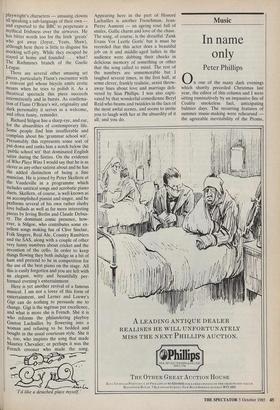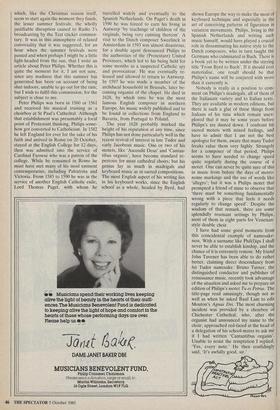Music
in name only
Peter Phillips
On one of the many dark evenings which shortly preceded Christmas last year, the editor of this column and I were sitting ruminatively by an impassive fire of Coalite smokeless fuel, anticipating balmier days. The recurring features of summer music-making were rehearsed the agreeable inevitability of the Proms,
which, like the Christmas season itself, seem to start again the moment they finish; the lesser summer festivals; the wholly justifiable disruption caused to Radio 3's broadcasting by the Test cricket commen- tary. It was in this atmosphere of relaxed conviviality that it was suggested, for an hour when the summer festivals were passed and when perhaps I might be a little light-headed from the sun, that I write an article about Peter Philips. Whether this is quite the moment for it, I am not sure, since any madness that this summer has generated has been on account of being shut indoors, unable to go out for the rain; but I wish to fulfil this commission, for the subject is close to me.
Peter Philips was born in 1560 or 1561 and received his musical training as a choirboy at St Paul's Cathedral. Although that establishment was presumably a focal point of Protestant thinking, Philips some- how got converted to Catholicism. In 1582 he left England for ever for the sake of his faith and arrived in Rome on 20 October, stayed at the English College for 12 days, then was admitted into the service of Cardinal Farnese who was a patron of the college. While he remained in Rome he must have met many of his most eminent contemporaries, including Palestrina and Victoria. From 1585 to 1590 he was in the service of another English Catholic exile, Lord Thomas Paget, with whom he travelled widely and eventually to the Spanish Netherlands. On Paget's death in 1590 he was forced to earn his living in Antwerp 'by teachinge of children of the virginals, being very cunning thereon'. A visit to the Dutch composer Sweelinck in Amsterdam in 1593 was almost disastrous, for a double agent denounced Philips to the authorities of the (Protestant) United Provinces, which led to his being held for some months as a suspected Catholic spy and provocateur. He was eventually re- leased and allowed to return to Antwerp. In 1597 he was made a member of the archducal household in Brussels, later be- coming organist of the chapel. He died in 1628, by which time he was the most famous English composer in northern Europe, his music widely published and to be found in collections from England to Bavaria, from Portugal to Poland.
The year 1628 probably marked the height of his reputation at any time, since Philips has not done particularly well in the recent revival of interest in late Tudor and early Jacobean music. One or two of his motets, like 'Ascendit Deus' and 'Cantan- tibus organis', have become standard re- pertoire for most cathedral choirs; but his genius lay as much in madrigals and keyboard music as in sacred compositions. The most English aspect of his writing lies in his keyboard works, since the English school as a whole, headed by Byrd, had shown Europe the way to make the most of keyboard technique and especially in the art of conceiving patterns of figuration in variation movements. Philips, living in the Spanish Netherlands and writing such music himself, would have played a crucial role in disseminating his native style to the Dutch composers, who in turn taught the Germans who culminated in Bach. There is a book yet to be written under the stirring title 'From Byrd to Bach'. If it should ever materialise, one result should be that Philips's name will be conjured with more than it currently is.
Nobody is really in a position to com- ment on Philips's madrigals, all of them of the Italianate variety and to Italian texts. They are available in modern editions, but there is such a glut of these things from Italians of his time which remain unex- plored that it may be some years before Philips's are dusted down. 1 confront his sacred motets with mixed feelings, and have to admit that I am not the best apologist for them, aware that many Tudor freaks value them very highly. Strangely for a composer of that period, Philips seems to have needed to change speed quite regularly during the course of a motet. One can never be quite sure of this in music from before the days of metro- nome markings and the use of words like `allegro'; but it was a Philips motet that prompted a friend of mine to observe that `there must be something fundamentally wrong with a piece that feels it needs regularly to change speed'. Despite the wisdom of that remark, there are some splendidly resonant settings by Philips, most of them in eight parts for Venetian- style double choir.
I have had some good moments from this coincidental example of namesake- ness. With a surname like Phil(l)ips I shall never be able to establish kinship, and the chance of it is extremely remote. My friend John Tavener has been able to do rather better, claiming direct descendancy from his Tudor namesake. Bruno Turner, the distinguished conductor and publisher of renaissance music, recently took advantage of the situation and asked me to prepare an edition of Philips's motet Tu es Petrus. The title-page read amusingly, though not as well as when he asked Basil Lam to edit Mouton's Agnus Dei. The most charming incident was provided by a choirboy of Chichester Cathedral, who, after the organist had announced my name to the choir, approached red-faced at the head of a delegation of his school-mates to ask me if I had written 'Cantantibus organis'. Unable to resist the temptation I replied, `Yes, every note.' He then confidingly said, 'It's awfully good, sir.'



























































 Previous page
Previous page